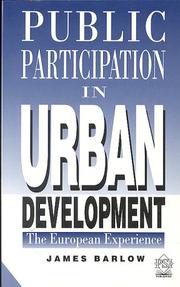| Listing 1 - 10 of 2969 | << page >> |
Sort by
|
Book
ISBN: 9264588272 9264811478 Year: 2020 Publisher: Paris : OECD Publishing,
Abstract | Keywords | Export | Availability | Bookmark
 Loading...
Loading...Choose an application
- Reference Manager
- EndNote
- RefWorks (Direct export to RefWorks)
Jordan is undertaking ambitious decentralization reforms to place citizens at the heart of local policies and services. This review analyses the main gaps in the current needs assessment process, which aims to mainstream a participatory approach for the design of local development plans and budgetary allocations through a yearly collection and assessment of citizens' needs.
Book
ISBN: 8382206840 8382206832 Year: 2021 Publisher: Łódź : Wydawnictwo Uniwersytetu Lódzkiego (University of Lodz Publisher),
Abstract | Keywords | Export | Availability | Bookmark
 Loading...
Loading...Choose an application
- Reference Manager
- EndNote
- RefWorks (Direct export to RefWorks)
"Przedmiotem rozważań podejmowanych w publikacji jest problematyka samozarządzania w strukturach organizacyjnych instytucji publicznych oraz wykorzystywania alternatywnych form dostarczania usług publicznych, ze szczególnym uwzględnieniem tych, które angażują w te procesy samych obywateli. Jej celem jest przede wszystkim usystematyzowanie wiedzy w tych dwóch obszarach, zdefiniowanie powiązanych z nimi podstawowych pojęć i procesów oraz klasyfikacja opisywanych rozwiązań. Opisane na kartach książki zagadnienia nie były do tej pory kompleksowo analizowane przede wszystkim w literaturze krajowej, ale również międzynarodowej. Za nowatorskie należy uznać: -- propozycje związane z typologią samoobsługi; -- interesujące poznawczo zestawienie cech charakterystycznych modeli świadczenia usług publicznych; -- szczegółowe rozważania na temat samoorganizacji i samoświadczenia usług publicznych w praktyce. Publikacja adresowana jest do szerokiego grona odbiorców. Po pierwsze, do środowiska praktyków z sektora publicznego (przedstawicieli władz oraz pracowników administracji publicznej); po drugie, do przyszłych praktyków - studentów wybranych kierunków szkół wyższych; po trzecie zaś, do mieszkańców jako prosumentów usług publicznych."-- Provided by publisher.
Book
ISBN: 1800081235 1800081243 Year: 2023 Publisher: London : UCL Press,
Abstract | Keywords | Export | Availability | Bookmark
 Loading...
Loading...Choose an application
- Reference Manager
- EndNote
- RefWorks (Direct export to RefWorks)
Engaged Urban Pedagogy presents a participatoryapproach to teaching built environment subjects by exploring 12examples of real-world engagement in urban planning involvingpeople within and beyond the university. Starting with curriculumreview, course content is analysed in light of urban pasts, race,queer identity, lived experiences and concerns of urbanprofessionals. Case studies then shift to focus on techniques forparticipatory critical pedagogy, including expanding the'classroom' with links to live place-making processes, connectionsmade through digital co-design exercises and student-led podcastingassignments. Finally, the book turns to activities beyond formaluniversity teaching, such as where school-age children learn abouttheir own participation in urban processes alongside universitystudents and researchers. The last cases show how academics haveenabled co-production in local urban developments, trainedcommunity co-researchers and acted as part of a city-to-citylearning network. Throughout the book, editorial commentaryhighlights how these activities are a critical source of supportfor higher education.
Together, the 12 examples demonstrate the power and range of anengaged urban pedagogy. They are written by academics, universitystudents and those working in urban planning and place-making.Drawing on foundational works of critical pedagogy, they present adistinctly urban praxis that will help those in universitiesrespond to the built environment challenges of today.
.Book
ISBN: 3879750750 Year: 1976 Publisher: Hamburg VSA
Abstract | Keywords | Export | Availability | Bookmark
 Loading...
Loading...Choose an application
- Reference Manager
- EndNote
- RefWorks (Direct export to RefWorks)
Book
Year: 2020 Publisher: Manchester, UK : Manchester University Press,
Abstract | Keywords | Export | Availability | Bookmark
 Loading...
Loading...Choose an application
- Reference Manager
- EndNote
- RefWorks (Direct export to RefWorks)
This book examines the relationship between environmental justice and citizen science, focusing on enduring issues and new challenges in a post-truth age. Debates over science, facts, and values have always been pivotal within environmental justice struggles. For decades, environmental justice activists have campaigned against the misuses of science, while at the same time engaging in community-led citizen science. However, post-truth politics has threatened science itself. This book makes the case for the importance of science, knowledge, and data that are produced by and for ordinary people living with environmental risks and hazards. The international, interdisciplinary contributions range from grassroots environmental justice struggles in American hog country and contaminated indigenous communities, to local environmental controversies in Spain and China, to questions about "knowledge justice," citizenship, participation, and data in citizen science surrounding toxicity. The book features inspiring studies of community-based participatory environmental health and justice research; different ways of sensing, witnessing, and interpreting environmental injustice; political strategies for seeking environmental justice; and ways of expanding the concepts and forms of engagement of citizen science around the world.-- Provided by publisher.
Book
Year: 2006 Publisher: [Washington, D.C.] : United States Environmental Protection Agency,
Abstract | Keywords | Export | Availability | Bookmark
 Loading...
Loading...Choose an application
- Reference Manager
- EndNote
- RefWorks (Direct export to RefWorks)
Book
ISBN: 9291461075 Year: 2002 Publisher: Nairobi International Livestock Research Institute
Abstract | Keywords | Export | Availability | Bookmark
 Loading...
Loading...Choose an application
- Reference Manager
- EndNote
- RefWorks (Direct export to RefWorks)
Woodlots --- Management --- Citizen participation
Book
Abstract | Keywords | Export | Availability | Bookmark
 Loading...
Loading...Choose an application
- Reference Manager
- EndNote
- RefWorks (Direct export to RefWorks)
Book
ISBN: 3811400959 Year: 1976 Publisher: Karlsruhe Müller
Abstract | Keywords | Export | Availability | Bookmark
 Loading...
Loading...Choose an application
- Reference Manager
- EndNote
- RefWorks (Direct export to RefWorks)

ISBN: 0853746443 Year: 1995 Publisher: London Policy Studies Institute (PSI publishing)
Abstract | Keywords | Export | Availability | Bookmark
 Loading...
Loading...Choose an application
- Reference Manager
- EndNote
- RefWorks (Direct export to RefWorks)
| Listing 1 - 10 of 2969 | << page >> |
Sort by
|

 Search
Search Feedback
Feedback About UniCat
About UniCat  Help
Help News
News